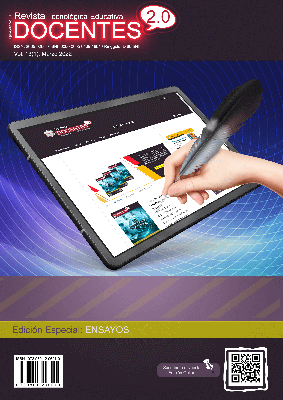Metaverses in the Context of Virtual Education
 DOI:
https://doi.org/10.37843/rted.v13i1.300
DOI:
https://doi.org/10.37843/rted.v13i1.300
Main Article Content
Abstract
The transcendental practices in the use of emerging technologies are virtual ecosystems in the educational field, by guaranteeing the creation of an immersive environment of interaction and multisensory linked to multi-user online applications, which generates events with extraordinary technological developments on the Internet. The purpose of the argumentative essay was to address reflections on the characteristics and influence that 3D tools play in the teaching/learning process. The inquiry was structured in two (2) large formal sections: the first was emerging disruptive technological trends that include technologies, mobile devices, as well as the generation of innovative digital training scenarios, and the second described virtual worlds as multisensory tools from the incidence of the potential offered by the incipient scenario of virtual reality, as training resources in the cyberculture of education. The writing was carried out under the interpretive paradigm supported by the qualitative methodological perspective; by means of the technique of reading through a heuristic calculation. Likewise, an exhaustive review of printed and digital sources was used, such as: books, magazines, dictionaries, theses, online newspapers, web pages, management of audiovisual documents, illustrations, videos, among other types of recordings. Finally, the question was raised: To what extent does the metaverse influence the teaching/learning process based on the context of virtual education? Revealed throughout the development of the investigation by combining the keywords.
Downloads
Metrics
Article Details

This work is licensed under a Creative Commons Attribution-NonCommercial-NoDerivatives 4.0 International License.
Those authors who have publications in our journal accept the following terms:
- When a work is accepted for publication, the author retains rights of reproduction, distribution of his/her article for exploitation in all countries of the world in the format provided by our magazine and any other magnetic medium, optical, and digital.
- Authors will retain their copyright and guarantee the journal the right first to publish their work, which will be simultaneously subject to the Creative Commons Acknowledgment License (Attribution-NonCommercial-NoDerivatives 4.0 International (CC BY-NC-ND 4.0)). That allows third parties to copy and redistribute the material in any medium or format, under the following conditions: Acknowledgment - You must properly acknowledge authorship, provide a link to the license, and indicate if any changes have been made. You may do so in any reasonable way, but not in a way that suggests you have the licensor's endorsement or receive it for your use. NonCommercial - You may not use the material for a commercial purpose. NoDerivatives - If you remix, transform, or build from the material, you cannot broadcast the modified material. There are no additional restrictions - You cannot apply legal terms or technological measures that legally restrict you from doing what the license allows.
- Authors may adopt other non-exclusive license agreements to distribute the published version of the work (e.g., deposit it in an institutional archive or publish it in a monographic volume) provided that the initial publication in this journal is indicated.
- Authors are allowed and recommended to disseminate their work through the Internet (e.g., in institutional telematic archives, repositories, libraries, or their website), producing exciting exchanges and increasing the published work's citations.
- Request of withdrawal an article has to be done in writing by the author to the Editor, becoming effective after a written response from the Editor. For this purpose, the author or authors will send correspondence via e-mail: [email protected].
- The author will not receive financial compensation for the publication of his work.
- All Docentes 2.0 Journal publications are under the Open Journal System (OJS) platform at: https://ojs.docentes20.com/.
References
Anacona, J., Millán, E., & Gómez, C. (2019). Aplicación de los metaversos y la realidad virtual en la enseñanza. http://www.scielo.org.co/scielo.php?script=sci_arttext&pid=S1909-83672019000100059 DOI: https://doi.org/10.31908/19098367.4015
Borja, I., Cortez, M., & Carrillo, W. (2019). Estudio Sobre la Situación Actual de la Docencia en la Educación y Formación Técnica Profesional (EFTP), en Bolivia, Colombia, Ecuador y Venezuela. https://es.unesco.org/sites/default/files/doc-estudio-situacion-docencia-23-09-2021.pdf
Cantu?-Marti?nez, P. (2022). I Congreso Internacional para el perfeccionamiento del sistema educativo. Revista Cátedra. 5, 71–79. https://revistadigital.uce.edu.ec/index.php/CATEDRA/article/view/3487
CIO (2022). Metaverso y conectividad: ¿qué se necesita para desplegar el nuevo mundo virtual? Inteligencia artificial. https://cio.com.mx/metaverso-y-conectividad-que-se-necesita-para-desplegar-el-nuevo-mundo-virtual/
Chicaiza, V., Padilla R., Chicaiza, S., & Paredes, L. (2022). Tecnología de la realidad aumentada en el Interaprendizaje. Revista científica mundo de la investigación y el conocimiento. 6(1), 145-155. Https://recimundo.com/~recimund/index.php/es/article/view/1514/1949 DOI: https://doi.org/10.26820/recimundo/6.(1).ene.2022.145-155
Díaz, V., Sampedro, B., & Vega, E. (2022). La realidad virtual y aumentada en el aula de secundaria. Universidad de Córdoba, http://www.uajournals.com/ojs/index.php/campusvirtuales/article/view/1030
Guzmán, R., Valencia, L., & Castaño, A. (2019). Sinergia Digit@l: Aportes a la educación superior virtual. Universidad Europea de Monterrey. https://www.researchgate.net/publication/338263960_Sinergia_Digitl_Aportes_a_la_Educacion_Superior_Virtual
Lanier, J. (2017). Dawn of the new everything: Encounters with reality and virtual reality. Henry Holt Company. https://es.b-ok.lat/book/3493779/4af3b8
Mendoza, L. & Quintero, P. (2022). Uno Sapiens Boletín Científico de la Escuela Preparatoria Revista: Uno Sapiens Boletín Científico de la Escuela Preparatoria, 1. 6-8. https://repository.uaeh.edu.mx/revistas/index.php/prepa1/article/view/8265/8496
Migue?lez, B., Núñez, P., & Man?as, L. (2019). La realidad virtual inmersiva como herramienta educativa para la transformacio?n social: Un estudio exploratorio sobre la percepción de los estudiantes en Educación Secundaria Postobligatoria
https://reunido.uniovi.es/index.php/AA/article/view/13084/12448
Morduchowicz, R. (2021). Competencias y habilidades digitales. Organización de las Naciones Unidas para la Educación, la Ciencia y la Cultura. https://unesdoc.unesco.org/ark:/48223/pf0000380113.locale=en
Pacheco, X., & Rosales, E. (2022). TIC en la educación en contextos de disrupción tecnológica. https://reciamuc.com/index.php/RECIAMUC/article/view/770/1153 DOI: https://doi.org/10.26820/reciamuc/6.(1).enero.2022.139-148
Park, S., & Kim, Y. (2022). A metaverse: taxonomy, components,
applications, and open challenges. https://ieeexplore.ieee.org/stamp/stamp.jsp?arnumber=9667507
Paz, G. (2021). Google Cardboard 3D-VR: Dispositivo de realidad virtual para el aprendizaje inmersivo en el entrenamiento policial. Revista Perspectivas. 6, (21), 211-226. https://revistas.uniminuto.edu/index.php/Pers/article/view/2724
Unesco (2021). Organización de las Naciones Unidas para la Educación, la Ciencia y la Cultura https://unesdoc.unesco.org/ark:/48223/pf0000380113.locale=en
Unesco (2022). Día Internacional de la Educación 2022: cambiar de rumbo para transformar el aprendizaje. https://es.unesco.org/news/dia-internacional-educacion-2022-cambiar-rumbo-transformar-aprendizaje
Vicmix (2021). Metaverso y educación: posibilidades en el futuro de la realidad extendida. https://vicmixreality.com/2021/12/15/metaverso-educacion-posibilidades-en-el-futuro-de-la-realidad-extendida/






